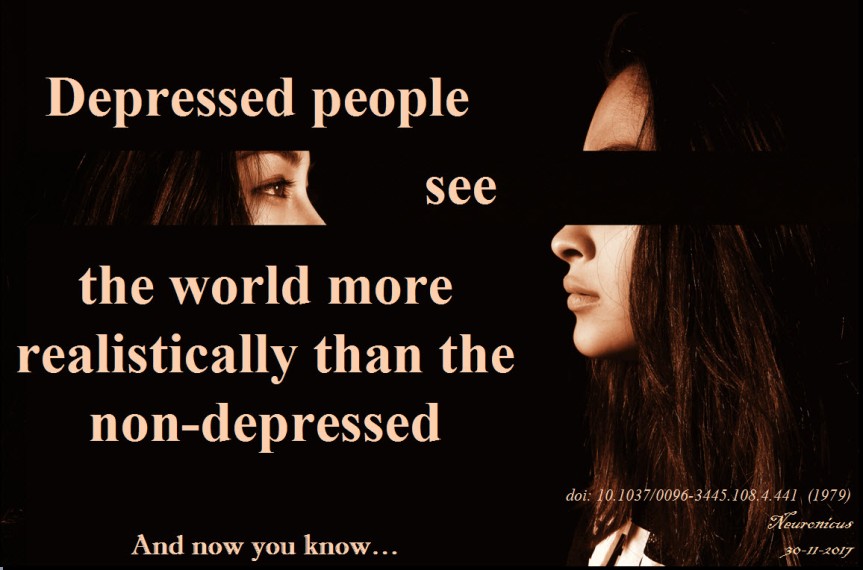There is a rumor stating that depressed people see the world more realistically and the rest of us are – to put it bluntly – deluded optimists. A friend of mine asked me if this is true. It took me a while to find the origins of this claim, but after I found it and figured out that the literature has a term for the phenomenon (‘depressive realism’), I realized that there is a whole plethora of studies on the subject. So the next following posts will be centered, more or less, on the idea of self-deception.
It was 1979 when Alloy & Abramson published a paper who’s title contained the phrase ‘Sadder but Wiser’, even if it was followed by a question mark. The experiments they conducted are simple, but the theoretical implications are large.
The authors divided several dozens of male and female undergraduate students into a depressed group and a non-depressed group based on their Beck Depression Inventory scores (a widely used and validated questionnaire for self-assessing depression). Each subject “made one of two possible responses (pressing a button or not pressing a button) and received one of two possible outcomes (a green light or no green light)” (p. 447). Various conditions presented the subjects with various degrees of control over what the button does, from 0 to 100%. After the experiments, the subjects were asked to estimate their control over the green light, how many times the light came on regardless of their behavior, what’s the percentage of trials on which the green light came on when they pressed or didn’t press the button, respectively, and how did they feel. In some experiments, the subjects were wining or losing money when the green light came on.
Verbatim, the findings were that:
“Depressed students’ judgments of contingency were surprisingly accurate in all four experiments. Nondepressed students, on the other hand, overestimated the degree of contingency between their responses and outcomes when noncontingent outcomes were frequent and/or desired and underestimated the degree of contingency when contingent outcomes were undesired” (p. 441).
In plain English, it means that if you are not depressed, when you have some control and bad things are happening, you believe you have no control. And when you have no control but good things are happening, then you believe you have control. If you are depressed, it does not matter, you judge your level of control accurately, regardless of the valence of the outcome.
Such illusion of control is a defensive mechanism that surely must have adaptive value by, for example, allowing the non-depressed to bypass a sense of guilt when things don’t work out and increase self-esteem when they do. This is fascinating, particularly since it is corroborated by findings that people receiving gambling wins or life successes like landing a good job, rewards that at least in one case are demonstrably attributable to chance, believe, nonetheless, that it is due to some personal attributes that make them special, that makes them deserving of such rewards. (I don’t remember the reference of this one so don’t quote me on it. If I find it, I’ll post it, it’s something about self-entitlement, I think). That is not to say that life successes are not largely attributable to the individual; they are. But, statistically speaking, there must be some that are due to chance alone, and yet most people feel like they are the direct agents for changes in luck.
Another interesting point is that Alloy & Abramson also tried to figure out how exactly their subjects reasoned when they asserted their level of control through some clever post-experiment questioners. Long story short (the paper is 45 pages long), the illusion of control shown by nondepressed subjects in the no control condition was the result of incorrect logic, that is, faulty reasoning.
In summary, the distilled down version of depressive realism that non-depressed people see the world through rose-colored glasses is correct only in certain circumstances. Because only in particular conditions this illusion of control applies and that is overestimation of control only when good things are happening and underestimation of control when bad things are happening. But, by and large, it does seem that depression clears the fog a bit.
Of course, it has been over 40 years since the publication of this paper and of course it has its flaws. Many replications and replications with caveats and meta-analyses and reviews and opinions and alternative hypotheses have been confirmed and infirmed and then confirmed again with alterations, so there is still a debate out there about the causes/ functions/ ubiquity/ circumstantiality of the depressive realism effect. One thing seems to be constant though: the effect exists.
I will leave you with the ponders of Alloy & Abramson (1979):
“A crucial question is whether depression itself leads people to be “realistic” or whether realistic people are more vulnerable to depression than other people” (p. 480).

REFERENCE: Alloy LB, & Abramson LY (Dec. 1979). Judgment of contingency in depressed and nondepressed students: sadder but wiser? Journal of Experimental Psychology: General, 108(4): 441-485. PMID: 528910. http://dx.doi.org/10.1037/0096-3445.108.4.441. ARTICLE | FULLTEXT PDF via ResearchGate
By Neuronicus, 30 November 2017



